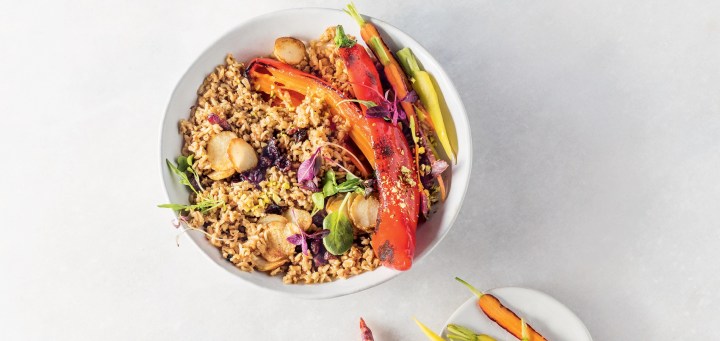SPONSORED CONTENT
Changing to a plant-based diet is easier than you think

Flexitarian or part-time vegetarian, plant-based eating is a trend that needs to stay, writes Dr Mosima Mabunda, Head of Wellness at Discovery Vitality. Here are some good reasons – and tips – for making the change.
The original African diet was healthy: a diet rooted in agriculture and sustained by green vegetables, grains and roots. Most African households would eat meat only once or twice a week. On the other days, our meals consisted largely of vegetables. Until recently, we never realised just how important this way of eating was for our health and wellbeing.
Unfortunately, these traditions have been replaced with increased meat consumption. Meat is associated with prosperity and is now a central part of our daily meals. I’m not sure if you’ve noticed that we tend to describe our dishes according to the type of meat we are eating: “Let’s have steak for dinner.” “We’re ordering chicken takeout.” “Friday nights are burger nights.” Because of the central space meat now holds in our meals, a scenario without it seems impossible to imagine for many.
But the impact this has on both our health and our environment is not a positive one. This is why, earlier this year, I started my journey to becoming a flexitarian. I took gradual steps – for about six months, I’ve made sure that most of my meals are plant-based and that most of the protein I consume is plant-based (for example, tofu, beans, lentils or chickpeas). I add animal protein every week or every alternate week, depending on how I feel.
This approach is one of being a flexible vegetarian – focusing on increasing your intake of plant-based meals rather than cutting meat out of your diet completely. That can feel like too drastic a lifestyle adjustment, especially if you’re not preparing meals just for yourself. I don’t expect my family to eat how (and what) I do and decided not to make an issue about my flexitarian journey. But I have included more plant-based dishes in our weekly menus. As a result, we are all eating more plant-based foods than before – which they have noticed and are enjoying, I might add.
I’ve already felt the difference on a day-to-day basis. My recent cholesterol check showed positive results and we’ve even seen a reduction in our grocery bills.

It’s a personal and planetary decision
There are many health benefits of eating less meat and following a plant-based diet. These include a healthier weight, and reduced risk for heart disease, type 2 diabetes and cancer. In addition, there’s a lot of literature on the environmental impact of meat production that we can no longer ignore. In fact, there are calls to revise dietary guidelines to address human and planetary health.
The EAT-Lancet Commission’s groundbreaking report on healthy and sustainable diets created awareness that we need to make major adjustments to our diets. If we are to sustainably provide healthy diets for the estimated 10 billion people on the planet by 2050, then the global consumption of fruits, vegetables, nuts and legumes will have to double, while the consumption of foods such as red meat will have to be cut by more than 50%. This shift is also likely to result in major health benefits, including preventing about 11 million premature deaths a year globally.
The production of plant foods produces fewer greenhouse gas emissions than that of animal foods. Shifting towards plant-based diets can also help prevent biodiversity loss and could significantly reduce global land use for agriculture by reducing the amount of land needed for grazing and growing crops. It takes almost a hundred times as much land to produce protein from beef than from peas, for example. I am sure this shift will go some way towards growing the agriculture industry, too.
Here is how we can make the change we want to see
On a personal-health level, you may worry about whether you’re getting enough protein by going ‘plant-forward’. Marion Nestle, author and Paulette Goddard Professor of Nutrition, Food Studies and Public Health, Emerita, at New York University, says: “People are very concerned about protein, but it’s a nonissue. It’s in grains, it’s in vegetables, it’s everywhere. It will find you.” So, if you’re eating a well-planned plant-based diet that includes a variety of healthy protein-rich foods such as traditional legumes, nuts and seeds, then you are probably getting enough protein – especially if you include the occasional animal protein.
How, then, do you add more plant-based foods to your diet? You could begin by introducing Meatless Mondays. This global movement was started in 2003 to encourage people to reduce meat in their diet for the sake of their health and the planet.
And there’s lots of other help available. I managed the change by buying vegetarian ready-meals, which made the cooking part easy and more affordable. I also took some classes at the Discovery Vitality HealthyFood Studio to learn how to cook yummy flexitarian meals, and followed a few flexitarian and vegetarian chefs and home cooks on social media.
For me, the shift has been manageable. And, I have to say, it has been enjoyable to rediscover the narratives I learned about food as a child with a health-conscious mom.
This is one trend that I am glad to get behind – not just for my and my family’s good health, but for the planet, too. DM/ML

Dr Mosima Mabunda, Head of Wellness at Discovery Vitality
















 Become an Insider
Become an Insider
This worries me. Has chemistry changed? When I studied this in the 1950s and 1960s the emphasis was on first class proteins (meat, fish, eggs, milk, cheese) and second class proteins which lacked the essential amino acids etc for building strong bodies, brains etc (peas, beans, lentils). How many studies, and for how long, have been done on development and IQ of humans raised on vegetarian diets?
There has been an enormous amount of research done on vegetarian and plant-based diets since the 60’s and the role of science is to continually expand and refine our understanding of our world and all that makes it tick.
Regarding the comment on “development and IQ of humans raised on vegetarian diets” – a large proportion of the Hindu population, for example, are strict vegetarians and if there was a problem with this way of eating then surely a worldwide “issue” would have presented itself by now.
Plant-based, complete proteins can, for the most part, be achieved with the right combinations of foods and for any gaps, there are supplements.